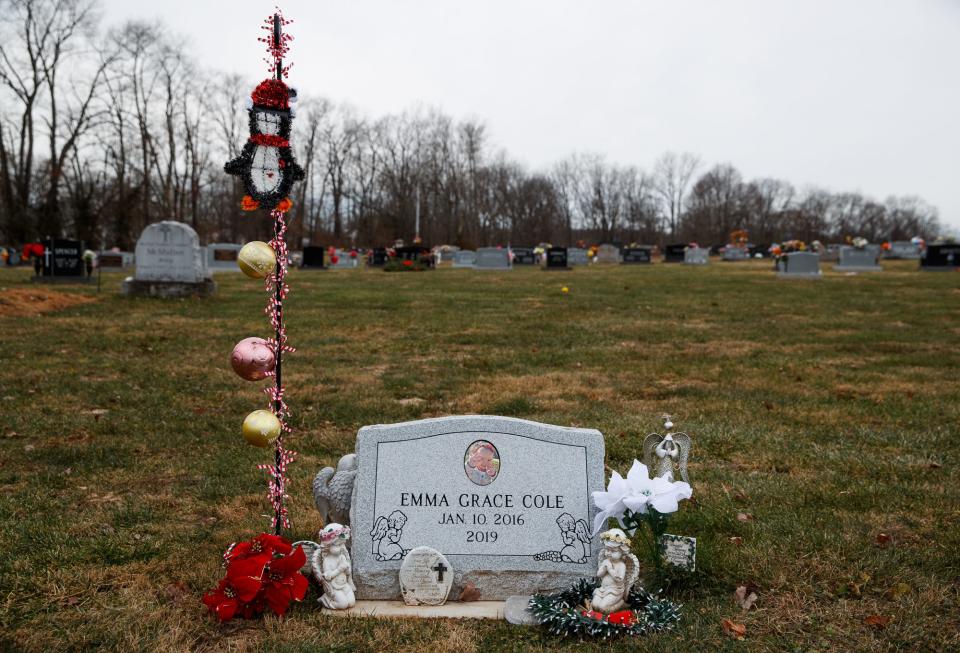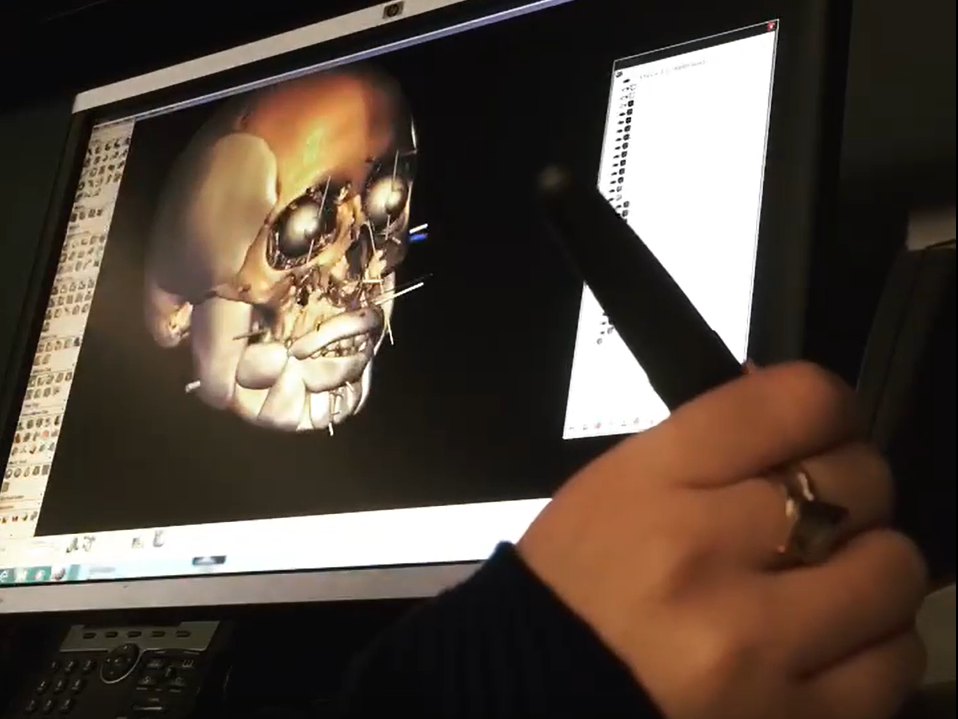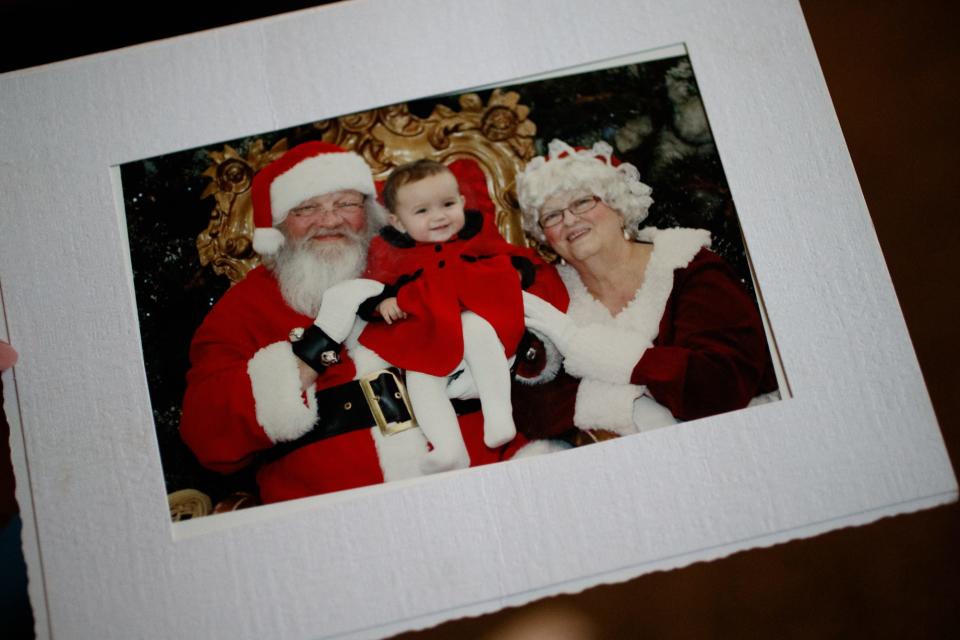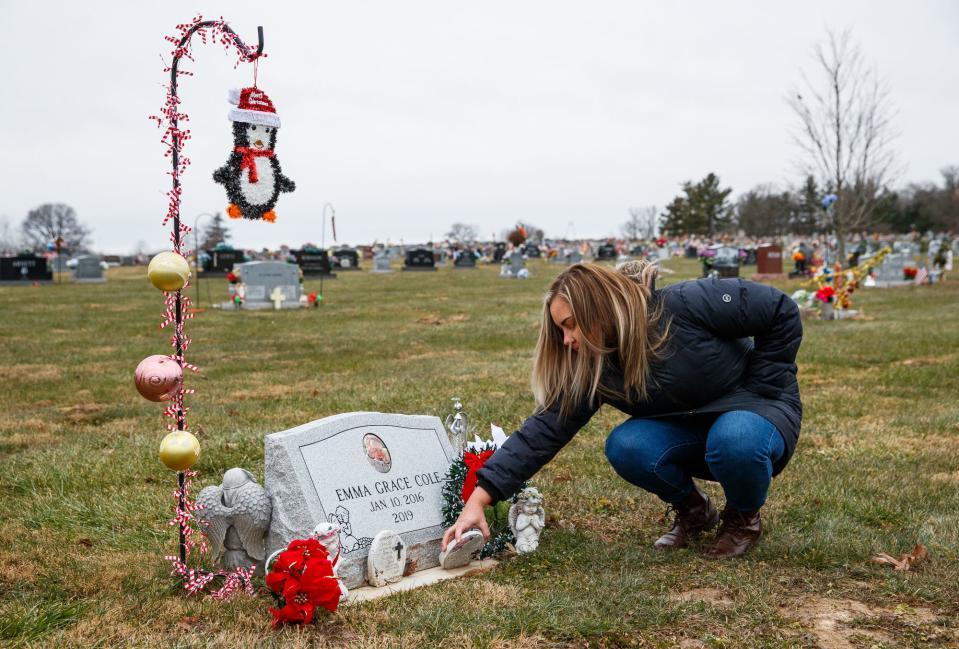She starved and beat her daughter, then burned her body. Emma Grace Cole's mom sentenced
She starved her daughter. She beat her with a belt, a spatula and a change purse.
She forced her to run in place with weights far too heavy for any 3-year-old to carry, and once Emma Grace Cole finally died − whether from malnutrition or "intentional suffocation" − she burned her body in a Smyrna softball field.
For these crimes, the toddler's mother, who appeared in court on Thursday in a red jumpsuit with black-rimmed glasses and her dark brown hair hanging straight down her back, will spend three decades behind bars.
Kristie Cole Haas, 31, was also sentenced to probation for the abuse of her other three children, Emma Grace’s half-siblings. The probation terms will run concurrently with the murder sentence.

Kent County Superior Court Judge Noel Primos did not impose the 30-year no-contact order between Haas and her children that prosecutors had requested, citing a lack of jurisdiction over them. Those children are living with Haas’ mother in Indiana.
He did, however, emphasize that there is a current no-contact order in place, saying it will remain as is unless a court of "competent jurisdiction" rules differently.
The sentence, which was handed down in a courtroom filled with Emma Grace's relatives and Haas' family, comes about four months after Haas pleaded guilty to murder by abuse or neglect.
Following last-minute negotiations in late May after learning that her husband was cooperating with prosecutors, she also pleaded guilty to abuse of a corpse and endangering the welfare of a child.
"The defendant left her daughter without a grave or a name," prosecutor Kevin Smith said at Thursday morning's sentencing.
Brandon Haas, Kristie’s husband, was sentenced to four years in prison Thursday afternoon.
He pleaded guilty in a closed hearing in March after negotiating with prosecutors. There was no recommendation for his sentence, meaning the decision was in Primos’ hands.
"A piece of me died that day," wrote Tanya Axsom Conley, Emma Grace's great aunt, about the day she learned of Emma Grace's death.
Smith read Conley's victim impact statement aloud to the court as the woman sat a few rows behind.
"No amount of time (in prison) will ever be enough for Kristie," Conley said.
Finding Emma Grace and ID'ing mom, stepdad
The investigation into 3-year-old Emma Grace’s death began in September 2019, when a child who was with their family discovered the girl’s “disarticulated, partially burnt” remains at Smyrna’s Little Lass Fields, according to a sentencing memorandum previously obtained by Delaware Online/The News Journal.
A family dog had brought one of Emma Grace’s bones to the family, and the child then found the girl by the banks of Duck Creek Pond, the memorandum said. Brush in the area was charred, and Haas later admitted to both police and her father via phone that she’d burned Emma Grace’s remains.
For days, investigators worked under tents to gather evidence and try to identify the girl. Given the condition of her body, however, it wasn’t until about two months later that the National Center for Missing and Exploited Children released two facial reconstruction sketches of what Emma Grace would have looked like when alive.
The images were based on CT scans of Emma’s skull and created by a forensic sketch artist.

While tips flooded in, none produced any tangible leads. Then, almost exactly a year after Emma Grace was found, her grandfather, James Cole, found the forensic sketch on the Smyrna Police Department website.
Cole had begun searching for the toddler after Haas’ sister, Kelsey Cole Navarro, reported a “strange conversation” with their mother and then Haas. Haas also hadn’t spoken to her father in more than a year, since June or July 2019 – right around when Emma Grace died, police would later learn.
Within weeks, the FBI had set up surveillance outside the Comfort Inn and Suites on Baltimore Pike in Glen Mills, Pennsylvania, where Haas, her husband and the living three children were staying. Kristie was spotted leaving the hotel with her son and dropped “several items” of trash in the hotel dumpster, which police collected for possible DNA.
BACKGROUND: 'Victim of child torture': New details emerge in murder of Emma Cole, girl found in Smyrna
Less than a week later, the Delaware Division of Forensic Science informed law enforcement that DNA taken from a straw Kristie threw out was a match to DNA taken from Emma Grace’s rib. Five days after that, the Haases were arrested separately in Pennsylvania.
‘A complex fiction’
While Brandon Haas was “immediately ready to tell police what had happened,” the sentencing memorandum said, Haas spent four hours lying to investigators, saying Emma Grace was in a facility in Virginia receiving care for mental problems.
She “invented a complex fiction” about the toddler’s progress at the facility and about having visited her there, the memo said. Finally, after agents confronted her about her lies, she told them that on a Saturday or Sunday morning before July 4, 2019, she woke up and found Emma Grace dead in the bedroom the toddler shared with her brother.
Haas also “attempted vaguely” to blame her husband for the girl’s death, the memorandum said, despite him not being in the house the night before or the morning Haas found Emma Grace dead.
Prosecutors have questioned the veracity of Haas’ statements regarding Emma Grace’s death, citing a Nemours Children’s Hospital doctor and child abuse expert’s opinion that “intentional suffocation cannot be ruled out.”
However, they do know that after Haas discovered Emma Grace, she informed her husband. According to both Hasses, Brandon Haas “(expletive) lost it” and wanted to call police, but his wife convinced him otherwise.
MORE DETAILS EMERGE: Inside the plea deals for mom, stepdad of toddler found dead in Smyrna softball field
Haas then took the girl to a place she called “somewhere beautiful” – later determined to be Little Lass Fields – but refused to tell her husband the location. He’d taken the three living kids for a drive while Haas discarded Emma Grace’s body.

In the FBI interview, Haas claimed she didn‘t bury her daughter because “she wasn’t somebody’s trash.” It remains unclear exactly how long Emma Grace’s body was there before she set it ablaze.
Haas told investigators that she burned the 3-year-old as “a symbolic measure to ‘set her free,’” the sentencing memorandum said.
Torture, abuse comes to light
In the months following the Hasses' arrests, Emma Grace’s three half-siblings were placed into foster care. All suffered malnutrition, which investigators strongly believe played a role in Emma Grace’s death.
As the living children began to recover both physically and, to a lesser extent, emotionally, they increasingly shared the horrific details of what they were subjected to by their mother and stepfather.
As previously reported by Delaware Online/The News Journal, that included forced exercise, such as pulling a weighted sled down the basement staircase, or wall sits, a leg exercise in which a person sits against the wall like they are in a chair but without support.
They were also subjected to chores inappropriate to their ages and even had hot sauce or pepper, “or something else spicy,” put under their tongue by Brandon Haas if they misbehaved.
Emma Grace, however, suffered the worst, all three told their therapists.
“She would be smacked, but was too young to run and couldn’t really do it,” one of Emma Grace’s siblings told a forensic interviewer. “If she stopped running, she would be hit with something … (including) a spatula, change purse, belt buckle and flip flops.”
The child also told the interviewer Emma had bruises on her face, stomach and legs, stating "bruises were everywhere and provided an illustration.”
ADDITIONAL COVERAGE: 'We've all been left out': Family not told prior to toddler's mother taking murder plea
As a result, the Nemours doctor and child abuse expert concluded that the Haases abused the living children but tortured Emma Grace.
The doctor stressed in her report that “in the vernacular, use of the word ‘torture’ commonly conjures images of crimes politically or militarily motivated, often committed by interrogators, jailers or other state agents.”
But in the case of child torture, there are very specific criteria that must be met.

Torture, she wrote in documents, is “a distinct form of child abuse” characterized by “a range of abusive caretaker behavior that is too extreme to be simply classified as abuse.”
“Emma Cole was a victim of child torture,” the doctor determined.
Notably, when the children were informed of their sister’s death – Haas had told them the same story that she was at a hospital getting help – all three “nearly immediately concluded” their mother was responsible.
Could more have been done?
In the years since Emma Grace died, her family has struggled with unknowns and regrets, each wondering if they could have done more to prevent Haas from regaining custody of the girl – a decision an Indiana judge made hastily at a September 2017 hearing – and then following up when she was in Delaware.
Tanya Axsom Conley, Emma Grace’s guardian for her first year-and-a-half of life in Indiana, tried to keep in contact with Haas and Emma Grace. But after the 3-year-old’s birthday in 2019, the video visits became more sporadic.
While Conley noted that Emma Grace was losing weight, her face growing increasingly emaciated, and spotted a bruise on the girl’s face during a Facetime call, there was only so much she could do from Indiana. The final video visit that Haas allowed was May 29, 2019 − less than two months before the toddler was killed.
Conley has repeatedly told Delaware Online/The News Journal she made reports to the Delaware Division of Family Services at the time. But given the Haases had moved around due to financial issues, she didn’t have a good address.
As a result, Delaware case workers couldn’t do much, they reportedly told her.
REMEMBERING EMMA GRACE: A passion for ‘Paw Patrol’ and a persuasive smile
Navarro, Haas’ sister, also said she didn’t know where her sister lived. The woman was cagey and not forthright when they talked, and “clammed up” whenever she would ask about Emma Grace. The communication was infrequent, too.
And Cole, Haas’ father, had completely lost contact with his daughter around the time of Emma Grace’s death, though he didn’t know until this past summer why she had stopped communicating.
He previously told Delaware Online/The News Journal he toyed with the idea of traveling to Delaware to look for her, but without knowing an address, he thought the trip from Kentucky, where he lives, would be fruitless.

The only people Haas remained close with were her mother − Belinda Johnson − and grandmother. Both women even came to Delaware when Emma Grace was still alive, though the grandmother left early due to a disagreement she had with Haas about how she parented, according to both Cole and Navarro.
But since-deleted Facebook posts also show that Johnson and her then-husband visited Delaware for Thanksgiving 2019, about two months after Emma Grace’s body was discovered.
Smith, the prosecutor, emphasized on Thursday that Johnson "never reported that Emma was no longer with" Haas.
"Delaware and Indiana both require anyone who suspects a child has been neglected or abused to make a report," Smith said. "Defendant's mother knew for over a year that Emma wasn't around anymore as she didn't hear her voice on phone calls.
"She accepted, apparently unquestioningly, the absurd story that Emma was at some facility for mentally ill toddlers," Smith continued. "That inaction has caused the state serious pause about her willingness to protect the children from her daughter."
It’s unknown what the woman was told about where Emma Grace was, though Haas said at sentencing that "my mother had no knowledge of my acts or my lies."
"I lied, that’s what I did," Haas said. "I lied to everybody."
Delaware Online/The News Journal has repeatedly been unable to get ahold of either Haas or Johnson for comment.
While Brandon Haas’ mother was “robustly engaged” in the children’s care up until late 2018 or early 2019 − even offering to take Emma Grace from her son and daughter-in-law − “due to a perceived disagreement" between her and the Haases, “Emma and the children were isolated away from her.”
In the summer of 2019, she said she “had no further interaction with Emma, with whom she had a prior close and loving relationship.”
A father’s regret, a mother's half-apology
At Thursday’s sentencing, Emma Grace’s father, Joshua Douthitt, was tearful as he spoke about the limited role he played in his daughter’s life.
He was in jail at the time of the girl’s birth, having long struggled – like Haas – with drug addiction. Douthitt did not initially believe Emma Grace was his daughter, but he accepted paternity when she was several months old.
Douthitt has since gotten sober and is married, and his wife and baby were by his side on Thursday. The trio traveled from Indiana for the court hearing.
As he spoke from a podium in the center of courtroom 8, the man expressed remorse, saying that when he carried Emma Grace’s small, pink casket to be lowered into the ground, he “felt complicit.”
“I was a terrible father – lost, selfish, but I was rebuilding my life and working hard,” Douthitt said. “The realization of that hurts to this very second.”
He was angry, too, however, saying Haas “led him on” and made him believe that he could adopt Emma Grace, when in fact, the toddler was already dead.
“The last time we spoke, I could have never imagined she passed away already,” Douthitt said. “You spoke like she would have had an amazing life. I will never understand your actions.”
Haas, for her part on Thursday, addressed some of what she did, saying she would “do anything in the world to be able to move back time and go back and correct my actions and my behavior.”
Her attorney also stressed that the 31-year-old's upbringing, drug use and abuse, including sexual abuse, should be considered mitigating factors in her crimes. Her life, Patrick Collins said, "has been a nonstop disaster."
"It is glib to say that everyone who has such horrible lives don't turn out to commit crimes and things like that and yes, that's true on its face," Collins said. "But you know what, sometimes they do. Sometimes they are ill-equipped to (deal with) abuse they have suffered at the hands of people who supposedly cared for them."
Yet in her statement to the court, Haas painted herself as a victim, saying she “lost a child” due to her and Brandon Haas’ actions. She also attempted to blame her husband, saying she “decided to go along with Brandon, decided not to get help.”
However, in admitting his role in the abuse of Emma Grace and the three living children, Brandon Haas told investigators that his wife’s punishment of the children was “excessive.” Both he and Haas also said that Haas was the one who convinced him not to call 911 after Emma Grace died.
Haas, additionally, did not once mention her daughter by name, and she only vaguely apologized to the girl, saying, “I'm sorry that my actions caused so much pain to my children and my mom.”
These words – and Haas' 30-year prison sentence – were not enough for much of Emma Grace’s family. Still, they said they take solace that the little girl, who was nameless for a year, is no longer in pain.
“I find what peace any human being can possibly find knowing that Emma can never suffer again at you or anyone else's hands,” Douthitt said, speaking to Haas while facing the judge. “I love you Emma and I pray one day I see you in heaven.”
Got a story tip or idea? Send to Isabel Hughes at ihughes@delawareonline.com. For all things breaking news, follow her on Twitter at @izzihughes_
This article originally appeared on Delaware News Journal: Mother of Emma Grace Cole sentenced for toddler's murder, abuse

